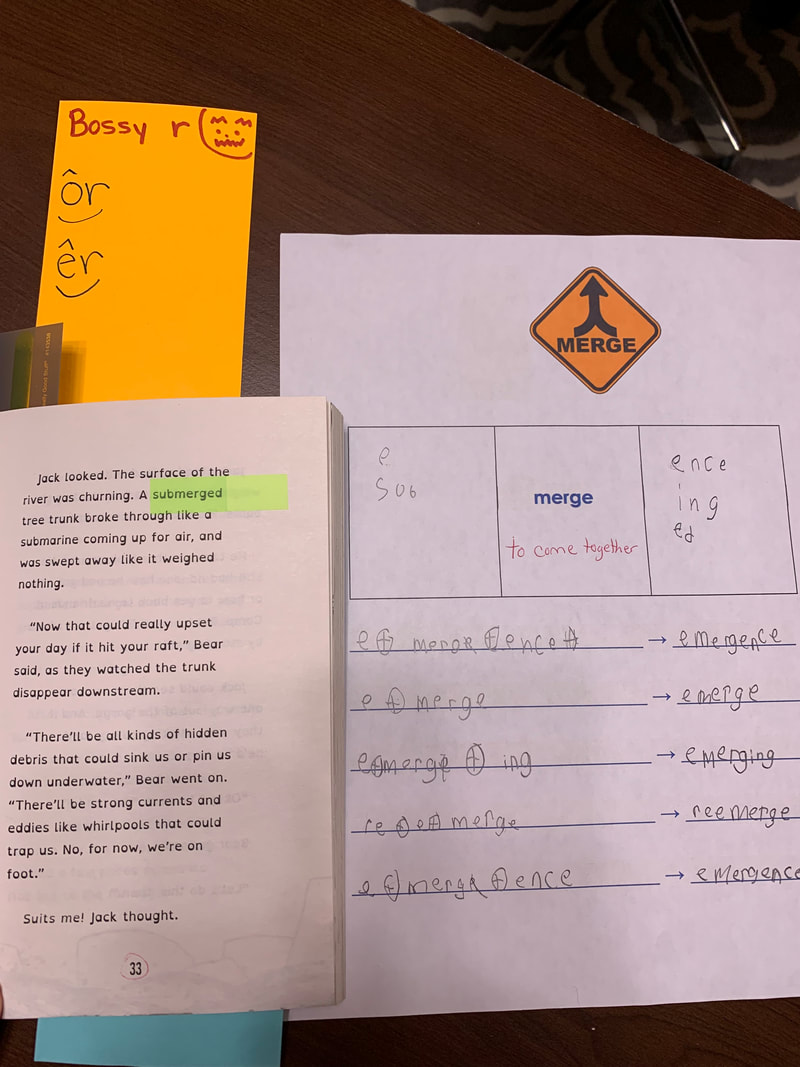 While reading together, your child will come across some interesting words. Sounding the words out to unlock how to pronounce them may slow down the reading to the point of losing all comprehension. It is a great support to your reader if you provide those words to continue the flow of meaning. Just keep track of those words. This list of interesting words becomes your source of investigation, especially if that word is repeated throughout the text. Most of the time, taking advantage of the moment is the best learning experience. I can plan ahead to my heart's content, but it does not always have the same impact as learning in the moment. This is exactly what happened in this session with one of my readers. I noticed that the text used the word <submerged> a few times. Each time, my reader came to the word, the pace slowed to sound-out the word. This word is a content word, meaning that it holds a strong meaning in the sentence like nouns and verbs typically do. When we speak, these content words are stressed or get a slightly higher pitch, like a little more emphasis. After we talked about what happened on the page and our reactions to the text, we found an agreed upon place to pause and check out this word. "What does it mean?" This is the first question we pose as a word scientist. Think about the clues in the sentences. What does the writer mean when he/she uses this word? "How is it built? Can we peel off any affixes? What do we hypothesize is the base?" As we think about the structure of the word, we typically use a white board or paper to box any proposed affixes and underline any base words. As we do this, we think about evidence from other words to prove the prefix or suffix is really a prefix or suffix. In our word, <sub> could be a prefix. What evidence do we have in other words? <Subway> <submarine> <subset>. We write these words and talk about their meaning and use in verbal sentences. Moving to the base word, <merge>. That was a new one! Can this base word stand alone like the other free bases that we know? Let's use a resource to help us! We check out etymonline.com to find out more information. Google images helped us with a picture connected to road signs and driving. We laughed as we connected this meaning to walking in the hallways of the high school. "What are some related words?" Think about how this base word can be used in other words. <merge> We record all related words we can think of on our whiteboard, making sure that the meaning connects to the meaning of <merge>. Then, an interesting story popped into my reader's head about her brother going to the <emergency> room. So, we just had to record that word and look at what could be peeled off, revealing the base word. There it was! And, in the process of analyzing, we discovered yet another prefix and suffix. Who knew that a prefix could be only one letter? "What graphemes are important here? How did we write the sounds that are represented?" Again, we have a quick talk about the importance of knowing the morphemes. Sounding it out has so many limitations. The best you can hope for is pronouncing it correctly, but if it doesn't lead to meaning, you can get lost. We discovered in just the base, <merge>, that <er> represents one sound and <ge> represents one sound. Interesting! What other words do we see this happening? More discoveries to be made! Why do all of this investigation with just one word? Well, this reader discovered 11 new related words sharing the same base, 3 new prefixes and 1 new suffix. Teaching each concept separately and out of the context of a piece of text would be taxing to the memory with nothing to anchor the new learning. Does it help comprehension of the text? Yes! Absolutely! Deeper meaning works that way!
0 Comments
Leave a Reply. |
AuthorI am loving learning! I've been an educator for over 30 years and a tutor for ten...and I'm constantly amazed at new discoveries about the brain, how we learn, and how new instructional strategies like Structured Word Inquiry, unlock readers who are stuck. New discoveries about our English language and the structure of words are absolutely the biggest "Ah-Ha" moments with students that I've ever encountered! Archives
November 2022
Categories |


 RSS Feed
RSS Feed